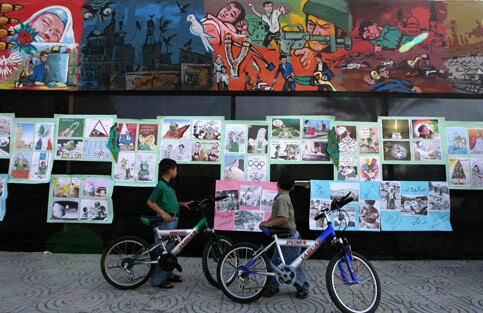The Electronic Intifada 21 May 2008

Palestinian boys stop to look at a street exhibit in Gaza City as part of an event marking the 60th anniversary of the Nakba, 16 May. (Wissam Nassar/MaanImages)
I had always heard from my family that the reason my aunt, Mary Kawar, stayed in Acre in 1948 was because her youngest daughter, Amal, had contracted typhoid. However, 60 years later, I read a reference to a 1948 dispatch sent by the International Committee of the Red Cross from Palestine that described a sudden typhoid epidemic in Acre. It hinted at the likelihood that Jewish militias had poisoned the Acre water supply — an early act of biological warfare in our region. It was then that I realized that my cousin’s illness was not a singular event.
I grew up hearing about what my own family lost in Jaffa, the coastal city from which Jewish militias drove them in 1948. There were occasional references to Deir Yassin — where more than 100 unarmed Palestinian villagers were massacred — and the role it played in the psychological war against the Palestinians, who fled fearing for their lives.
But, after the Israeli occupation of the West Bank in 1967 I began to block out that earlier tragedy. My energy was consumed by activism against the Israeli settlement project in the West Bank, where I live. It was only after reading the newly published material by Israeli historians — using the recently-opened Israeli archives — that a new cycle of confrontation with Palestinian history began for me.
I discovered how much of this history I had been suppressing. How skeptical I had become; how defensive against acknowledging many of these horrors that followed when, in 1948, the emerging state of Israel drove out more than 700,000 Palestinians to make way for a Jewish state. I had relieved myself from the full admission of the war crimes that my family and people had endured when we lost our homes and homeland, and when our previously-flourishing society was destroyed.
That my parents did not tell me more is not surprising. The psychology of the defeated is not to speak out, but rather to blame themselves (not unlike what is now taking place in Palestinian society). In the case of my father, it was also to pick himself up and get on with his life. And I was trying to pursue a similar policy after Israel defeated us in 1967. This is not unlike the children of Holocaust survivors who become silent in the face of the atrocity. It is only those who make an industry of catastrophe who dramatize and sensationalize.
But there is another reason for my new willingness to confront the crimes of the Nakba (Arabic for “catastrophe”), which is how Palestinians refer to the expulsion of 1948. It has to do with the failure of my struggle against the Israeli colonization of the West Bank. I was 16 in 1967 when the occupation began. I spent my adult years witnessing the transformation of my country from an exquisitely beautiful, pristine landscape to one dominated by hundreds of Jewish settlements, perched on hilltops like citadels, and fortified by barbed wire and walls. They fulfilled the promise that former Israeli prime minister Ariel Sharon had made to his countrymen in the 1980s that “we are going to leave an entirely different map of the country that … will be impossible to ignore.” As I witnessed this transformation I became aware of Israel’s attempt at changing the nature of the landscape to make it look more western just as had happened in Israel after the Nakba. The magnitude of the loss is immense and the consequences for our lives are devastating. As Palestinian inhabitants of the West Bank we have come to be confined in small enclaves surrounded by high walls and crisscrossed by gleaming black roads that, as non-Israelis, we are barred from using.
Not all Israelis who live in nearby settlements controlling the bulk of Palestinian land have moved there out of ideological commitment. Many, though, would defend their action by arguing that if Israel yields to Palestinian claims to the West Bank, then what would prevent Palestinians from going further and claiming the same right to such Israeli cities as Jaffa and Haifa where they were living not long ago?
It was after being repeatedly confronted with this argument that I became convinced that Israel’s unwillingness to recognize the Nakba is integral to its continuation of illegal settlement in the occupied West Bank. The incessant building of more settlements in the 23 percent of Palestine left for us to establish our state can only mean that Israel does not recognize our existence as a nation entitled, like all other nations, to self determination. Otherwise how could they support a settlement policy that deprives us of our right to our land?
By continuing its four-decade-old settlement policy Israel, is, in effect, seeking to make our lives so intolerable that we would be driven away from our land, albeit at a slower pace than was the case during the Nakba, 60 years ago.
Raja Shehadeh is an attorney in Ramallah and author of Palestinian Walks: Notes on a Vanishing Palestinian Landscape, which won the Orwell Prize in Britain last month. It will be released in the United States in June.





